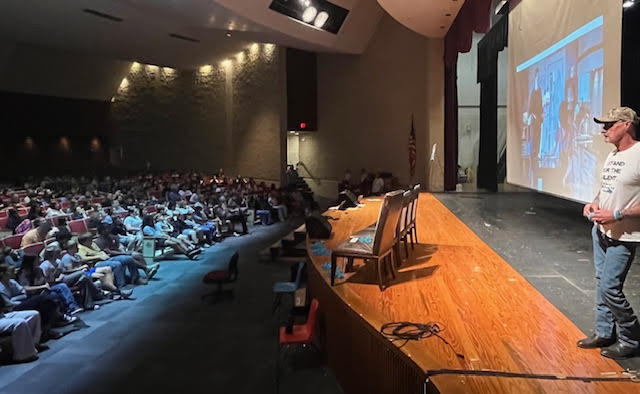Kirk Smalley isn’t your typical public speaker.
In fact, while speaking in front of Gentry Middle School students during a school assembly on Monday, Kirk admitted as much. He asked the students to show him grace if he stumbled — and asked them to hold up the sign language sign for love as encouragement to keep going when he needed it.
Wearing blue jeans and a ball cap, and with a few ain’ts and y’alls flowing from his vernacular, he wasn’t there to give the students a grandiose talk or lecture. He was there, simply, to tell the story of his son, Ty.
In 2010, 11-year-old Ty Smalley from Perkins, Oklahoma, tragically took his own life after being bullied for more than two years. Determined to honor Ty and protect other children from similar pain, Kirk and his late wife, Laura, began a journey that led them to embrace Stand for the Silent — an organization created by a group of high school students in Oklahoma City. What started small has grown into a national movement to end bullying and youth suicide.
Partnering with Stand for the Silent, Gentry Middle School students heard a powerful message that held their attention in complete silence for more than an hour. As Kirk paused at times to wipe away tears, hands showing love from the middle schoolers shot up — displaying the three-fingered symbol recognized across generations. The students were showing him the same kindness he ultimately asked them to show one another.
Yes, the topic was tough to hear. But it resonated. At one point, Kirk asked students to raise their hands if they had ever been bullied. Many hands were raised.
Kirk surveyed the room before offering a soft-spoken, thoughtful response:
“I love you,” he said. “You are somebody.”
He encouraged the kids to speak to trusted adults when they’re suffering from bullying. But just as importantly, he urged them to be the difference — to reach out to someone who is alone, friendless, or struggling, and to show them love, kindness, and friendship. He encouraged them to be that voice in their friend group — even if they were the only one — to stand up and say, “It’s not right to bully other kids.”
“Kids who are being bullied — they hide it real well,” he continued. “They get to where they don’t even want to say anything because they know the bullying might get worse.”
Since May 2010, Kirk and Laura have visited more than 6,700 schools, reaching more than 4.5 million students with a message of empathy, hope, and empowerment. In 2011, their work was recognized when they were invited to a private meeting with the President of the United States at the White House, followed by their participation in the inaugural White House Conference on Bullying Prevention.
But today in Gentry, Kirk was just a dad — speaking from the heart to kids who could have been his own.
It has been more than 5,000 days since Ty died — and Kirk knew the exact number (5,637 he said). He’s committed to making sure no other child feels that kind of pain.
At the end of his presentation, Kirk left students with a message:
“Be kind. Speak up. Be somebody who makes a difference.”
For more information, visit standforthesilent.org
About Gentry’s Anti-Bullying Programs
At Gentry Public Schools, we’re committed to providing a safe, respectful environment where every student can learn and grow. Bullying — whether physical, verbal, social, or online — is a serious issue that can have a lasting impact on a student’s well-being.
It’s important to note that not all unkind behavior meets the legal definition of bullying. Sometimes students make poor choices or have conflicts that don’t fall under these policies. But we take all concerns seriously.
To address situations effectively, early reporting is critical. The sooner we’re made aware of a concern, the better our chances of understanding what happened and responding appropriately. Reports that come in late or through social media are harder to investigate and resolve in a timely manner.
Gentry follows statewide bullying laws and policies. These provide a clear process, but also include specific definitions and limitations. While we strive to respond consistently and thoughtfully, sometimes outcomes aren’t always visible to others due to privacy laws or limited evidence.
Families play a vital role in prevention.
Conversations at home about respect, empathy, conflict resolution, and online behavior make a meaningful difference. When schools and families work together, students are better supported and safer.
If you have concerns about bullying, please reach out to your school’s administration. Contact information is available on each school page under the “Contact Us” tab.
Our bullying policy is included in the Parent-Student Handbook and is also available under the "Family Resources" tab and each school's page under the "Schools" tab. You’ll also find a helpful FAQ, though the policy itself is the official governing document and takes precedence in the event of any discrepancy.

